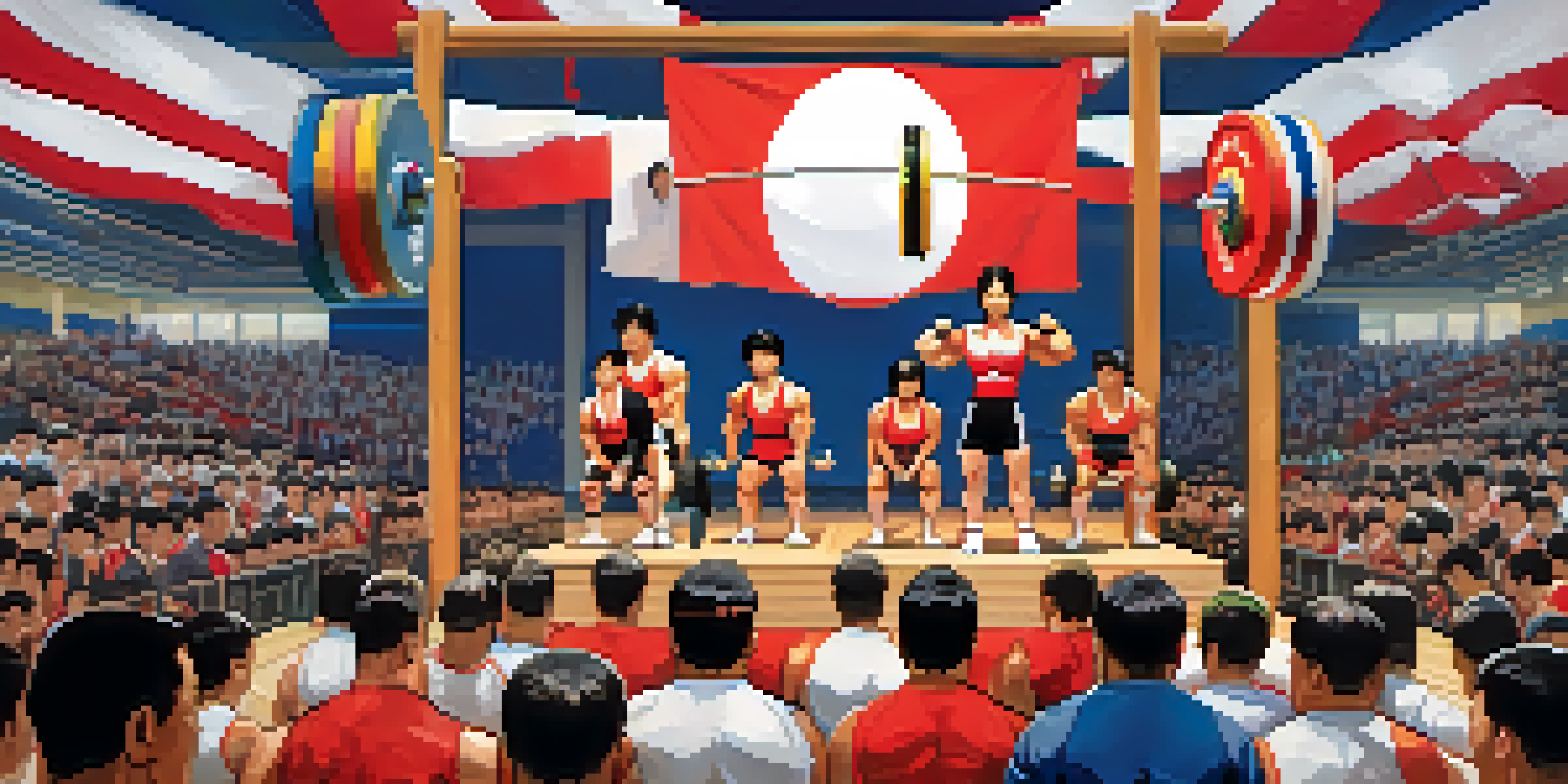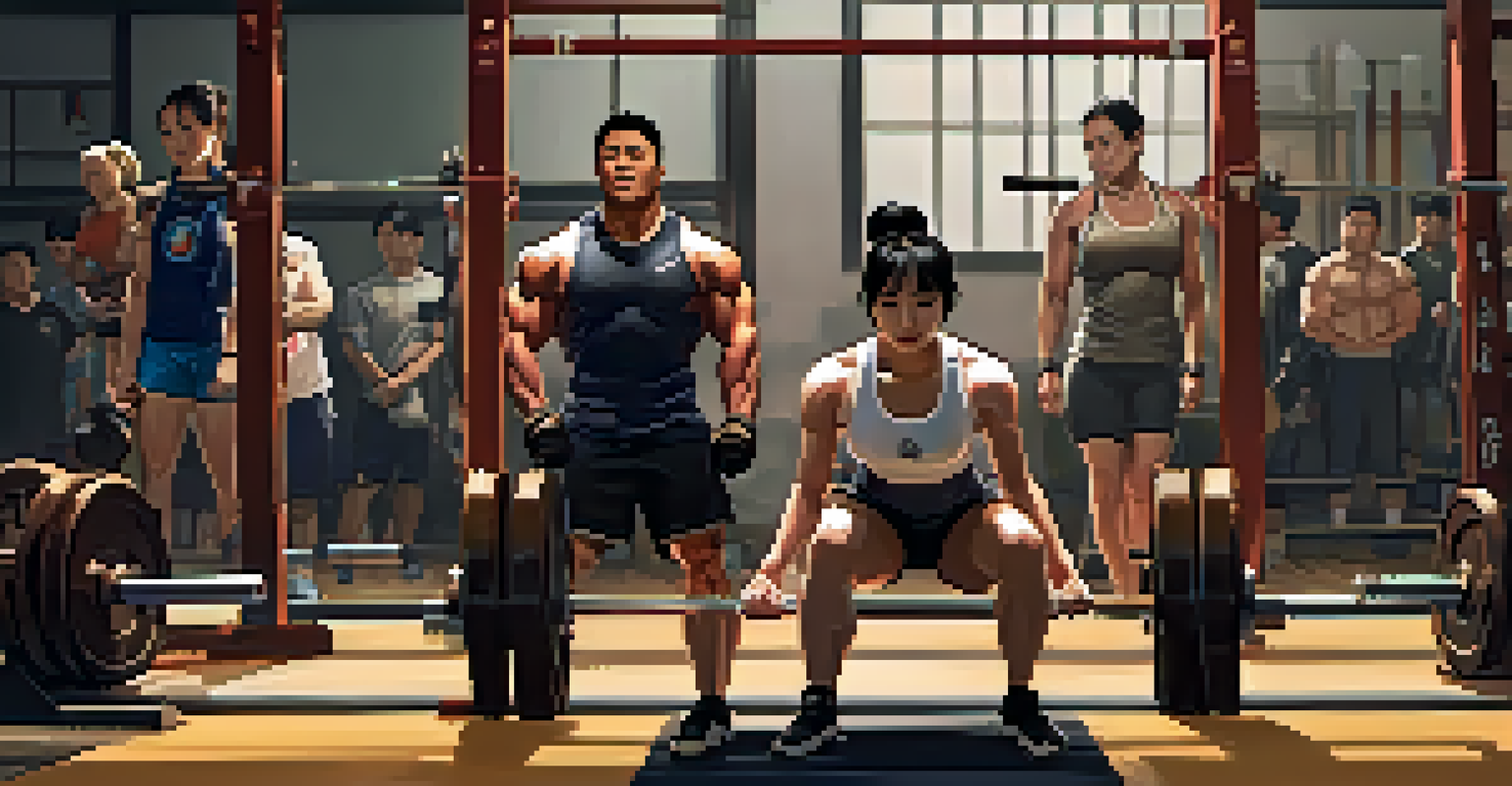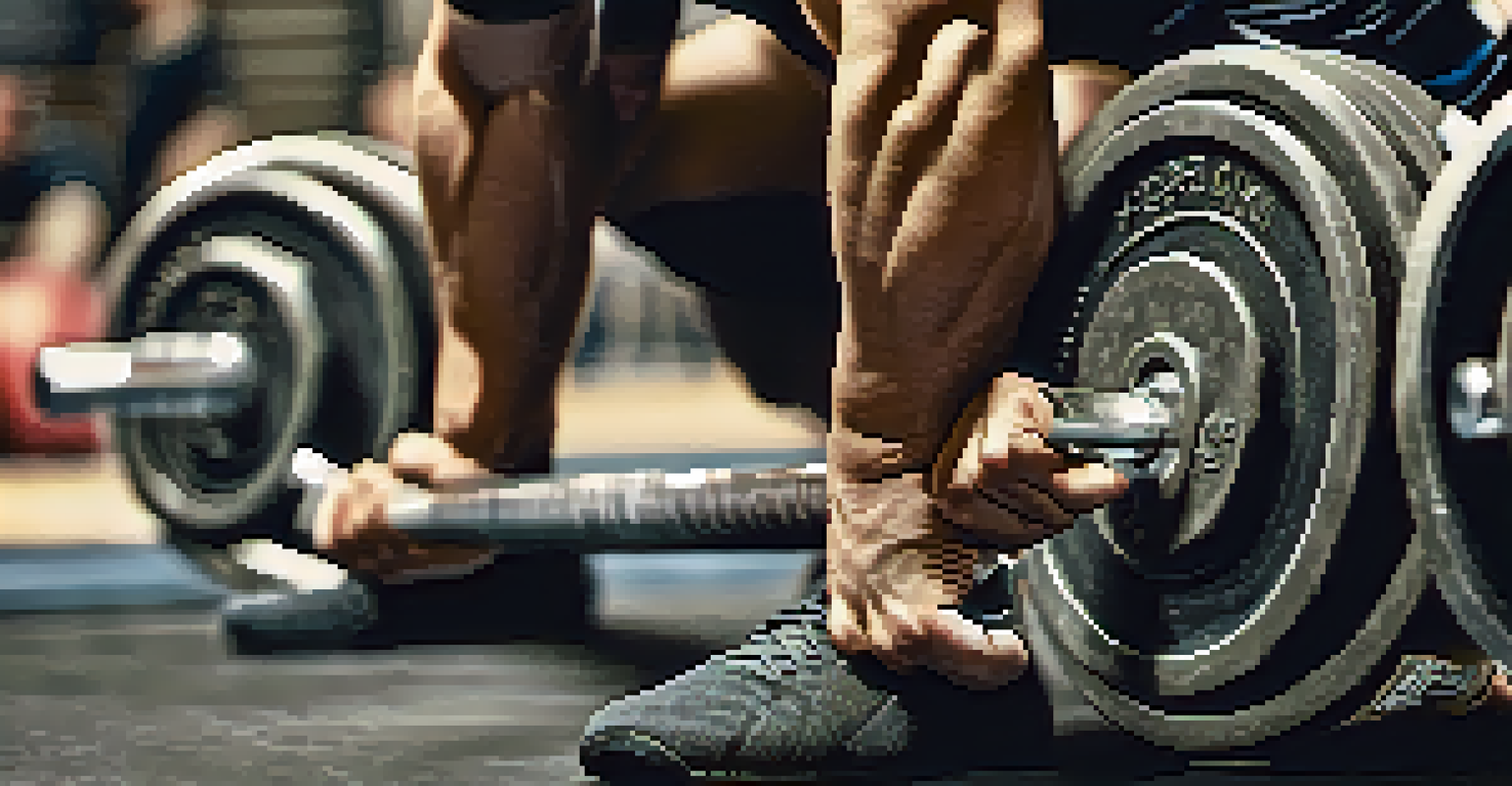Powerlifting Traditions: The Role of Strength in Japan

The Origins of Powerlifting in Japan
Powerlifting in Japan has deep roots, intertwining with the country's rich history of martial arts. This sport emerged as a distinct discipline in the 1980s, drawing inspiration from traditional strength training techniques. As powerlifting gained popularity, it began to reflect Japan's unique cultural values, emphasizing discipline, respect, and perseverance.
Strength does not come from physical capacity. It comes from an indomitable will.
In fact, many early powerlifters were influenced by the principles of judo and sumo wrestling, sports that require immense strength and technique. These influences shaped the training methodologies and competitive spirit seen in Japanese powerlifting today. The blend of these traditions fosters a strong community among athletes, who often train together and share their knowledge.
As powerlifting grew, it also became a platform for promoting physical fitness among a broader audience. Today, powerlifting competitions attract not only seasoned athletes but also newcomers eager to embrace the sport. This evolution highlights how powerlifting in Japan is not just about lifting weights, but also about building a supportive environment for strength enthusiasts.
Cultural Significance of Strength in Japan
In Japanese culture, strength is often associated with honor, resilience, and hard work. Traditional values are deeply embedded in the practice of powerlifting, where athletes aim not only to lift heavier weights but to embody the spirit of ‘ganbaru’—the determination to persist through challenges. This cultural mindset creates a connection between the lifter's performance and their personal growth.

Moreover, the concept of strength transcends physical capabilities; it also encompasses mental fortitude and emotional balance. Athletes train to overcome not just the weights on the bar but also their own limitations. This holistic approach to strength is a cornerstone of Japanese philosophy, resonating with the ideals of self-improvement and discipline.
Powerlifting's Cultural Roots
Powerlifting in Japan is deeply intertwined with traditional martial arts, reflecting values of discipline, respect, and perseverance.
As powerlifting continues to flourish in Japan, it serves as a reminder of the importance of these cultural values. Competitions often celebrate not just the winners but also the stories of perseverance and dedication from all participants. This emphasis on community and shared experience fosters a sense of belonging among powerlifters, reinforcing the cultural significance of strength in Japan.
Training Methods in Japanese Powerlifting
Training methods in Japanese powerlifting reflect a blend of traditional techniques and modern practices. Many athletes incorporate elements from martial arts, focusing on body awareness and movement efficiency. This not only enhances their physical performance but also cultivates a mindful approach to lifting, where every rep is performed with intention and focus.
The strength of the team is each individual member. The strength of each member is the team.
Additionally, Japanese powerlifters often emphasize the importance of technique over sheer strength. Lifters are trained to master their form, ensuring safety and effectiveness in their lifts. This dedication to technique can be seen in competitions, where precision is often celebrated as much as strength, illustrating the holistic nature of the sport.
The influence of community also plays a vital role in training. Athletes often train in groups, encouraging each other and sharing insights. This collaborative atmosphere fosters a culture of continuous improvement and support, making the journey of powerlifting a shared experience filled with camaraderie and motivation.
Notable Japanese Powerlifting Competitions
Japan hosts a variety of powerlifting competitions that showcase the talents of its athletes. Events like the All Japan Powerlifting Championships draw participants from across the country, elevating the competitive spirit and highlighting the skill levels of lifters. These competitions not only serve as a platform for athletes to demonstrate their strength but also to connect with the broader powerlifting community.
One of the most prestigious events is the Japan Powerlifting Federation (JPF) championships, which attracts elite lifters striving for national records. Such competitions often feature a mix of seasoned veterans and up-and-coming athletes, creating an exciting atmosphere for spectators and participants alike. The thrill of competition inspires lifters to push their limits and strive for personal bests.
Women Empowering Powerlifting
The rise of female athletes in Japanese powerlifting has redefined strength and fostered supportive communities, inspiring more women to engage in the sport.
Furthermore, these events often emphasize the importance of sportsmanship and respect among competitors. The culture of cheering for fellow athletes, regardless of the outcome, reflects the strong sense of community within the powerlifting world. This camaraderie reinforces the idea that powerlifting is not just about individual success, but about celebrating strength together.
Women in Japanese Powerlifting
The inclusion of women in Japanese powerlifting has been a transformative force for the sport. Over the years, female athletes have broken barriers and redefined what strength looks like, inspiring a new generation of lifters. Their participation has brought visibility to women’s powerlifting, encouraging more women to engage with the sport and pursue strength training.
Japanese female powerlifters have achieved remarkable feats, often competing at both national and international levels. Their accomplishments highlight the dedication and hard work that goes into training, proving that strength knows no gender. This growing representation empowers women to embrace their physical capabilities and challenge societal norms about femininity and strength.
Moreover, as women continue to excel in powerlifting, they are also fostering supportive networks among themselves. These communities provide mentorship and encouragement, helping each other navigate the challenges of training and competition. The rise of women in powerlifting not only enriches the sport but also contributes to a broader cultural shift towards equality and empowerment.
The Future of Powerlifting in Japan
Looking ahead, the future of powerlifting in Japan appears bright, with increasing interest from diverse demographics. As awareness of strength training grows, more individuals are embracing powerlifting as a means of fitness and personal development. This trend is likely to attract new athletes and expand the community, further enriching the sport’s landscape.
Additionally, advancements in training techniques and equipment are making powerlifting more accessible. Local gyms are increasingly incorporating powerlifting programs, catering to various skill levels. This accessibility encourages more people to try their hand at powerlifting, breaking down barriers and fostering a more inclusive environment.
Strength Beyond the Gym
The discipline learned from powerlifting translates into resilience and confidence in personal and professional life, highlighting strength as a collective journey.
Moreover, as the sport gains popularity, there is potential for Japan to host more international competitions. This would not only elevate the profile of Japanese powerlifting but also create opportunities for cultural exchange among athletes worldwide. With its rich traditions and values, Japan is set to continue making a significant mark on the global powerlifting scene.
The Role of Strength Beyond the Gym
Strength in Japan extends beyond the confines of the gym; it permeates various aspects of life. The discipline cultivated through powerlifting often translates into resilience in personal and professional endeavors. Athletes frequently describe how their training experiences shape their character, instilling a sense of confidence and determination that influences their everyday lives.
Furthermore, the values of respect and teamwork learned in powerlifting carry over into social interactions. Athletes often find themselves forming meaningful bonds with fellow lifters, creating a supportive network that encourages growth both inside and outside the gym. This sense of community fosters an environment where individuals can thrive together, reinforcing the idea that strength is a collective journey.

Ultimately, the significance of strength in Japan is more than just about lifting weights; it embodies a philosophy of perseverance, respect, and connection. As powerlifting continues to evolve, it will remain a vital part of the cultural fabric, inspiring individuals to embrace their strength in all aspects of life.